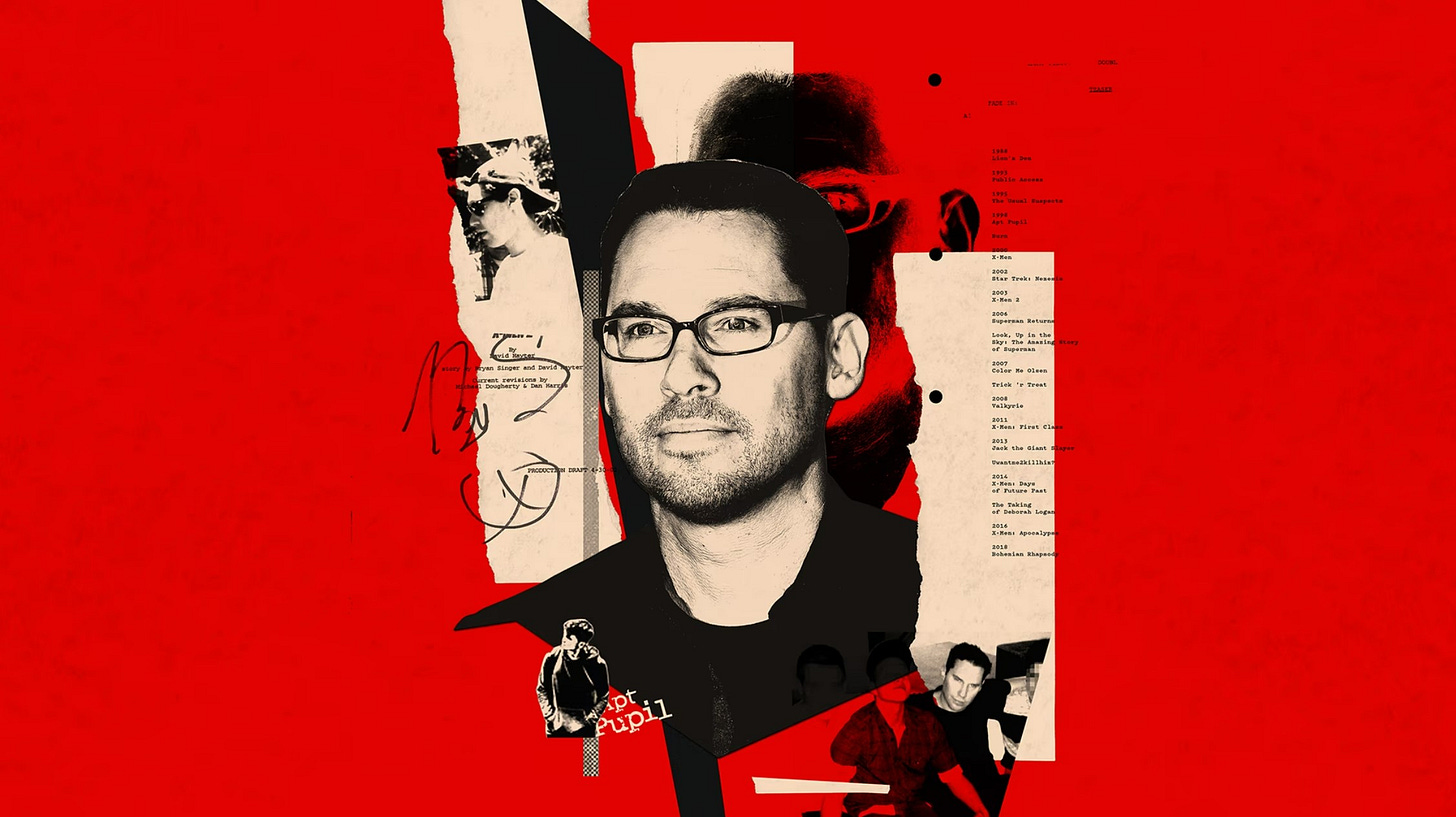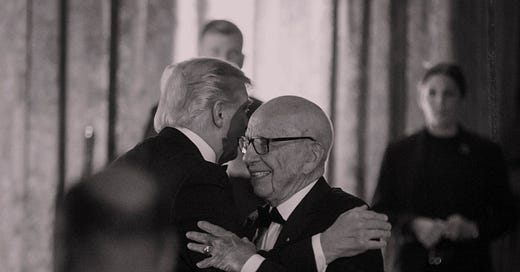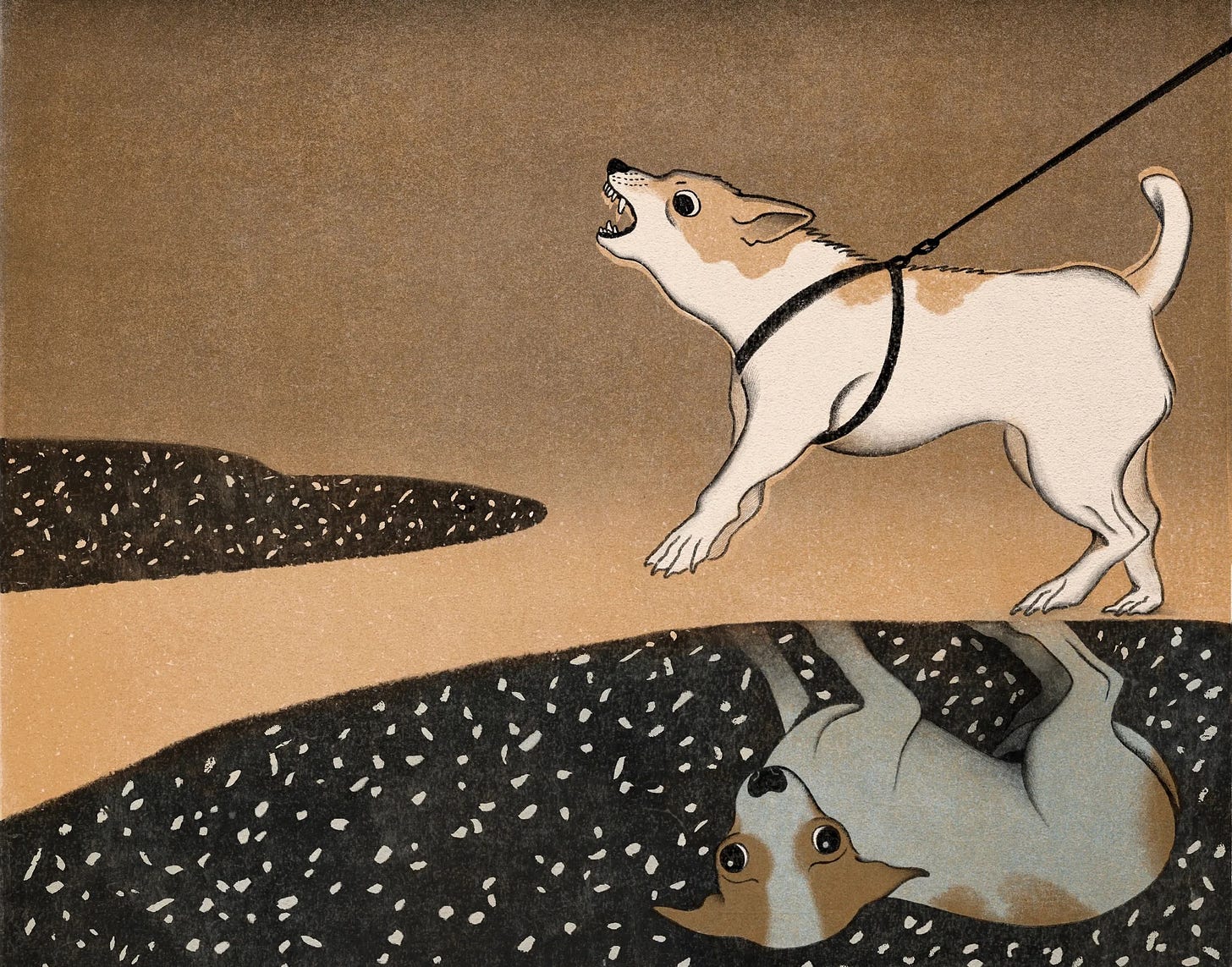As some of you know, I’ve spent the last few months all-consumed by my work on an investigative article that (fingers crossed) should see the light of day next week. It’s something I’ve never done before, and the process gave me a newfound appreciation for journalism as a profession; even if I still have qualms with it, I can now confidently say: it’s real hard, you guys. Earlier this year, I highlighted some long-form journalism in TV, book, and podcast form, but this time I wanted to uplift some articles that intrigued, surprised, and changed me—which is all I can hope for mine.
An investigation: How Rupert Murdoch’s Empire of Influence Remade the World
The pitch: it’s real-life Succession… literally.
Me gusta porque: the first time I ever heard Rupert Murdoch’s name was in the iconic Devil Wears Prada line when Miranda says that “Rupert Murdoch should cut me a check for all the papers I sell for him,” referring to the fact that the tabloids will feast on her divorce. At the time, I didn’t know who she was talking about, only that she seemed less evil without makeup (or husband). I would only learn the truth later, when I wondered how seriously I should take the new buzzy HBO show Succession and looked into it, discovering that it was somewhat based on the Murdoch family (owners of, amongst other things, Fox News). But not until this three-part investigation by Jonathan Mahler and Jim Rutenberg did I fully understand the family’s story and its inherent pathos: a patriarch who rules over a news empire that has actual power in shaping multiple countries’ governments, and who has yet to appoint one of his children to succeed him, causing endless infighting. The investigation is rich in details that give the family texture even if you disagree with their politics (though the piece was published by The New York Times, so don’t expect it to blow your mind with a nuanced take on conservativism), and even if it’s long, it uses the space it was given very effectively—I could not stop reading.
Where? The New York Times Magazine.
I’ve already read it! I can’t tell you what to do (I mean, I can, it’s the whole point of this newsletter—maybe I don’t want to). But I can tell you what I did, which was rewatching season three of Succession to see if I was still concerned about the show. Overall, my impression remained the same—I’m worried about the fact that multiple events that were sold to viewers as life-changing ended up having little effect on the plot, and what that does to my ability to care about the twists and turns. But it also allowed me to distinguish the gems, like episode 3, which sees Shiv meet the brutal limits of being a girlboss, and episode 7, a mini-movie about Kendall celebrating his birthday at The Shed and figuring out just how fucked up his life is in all areas. Even the finale, with its frustrating cut corners, is quite effective: watching Kendal, Shiv, and Roman come together in siblinghood both warmed my heart and made me scream “get out, stupid children!” at my TV.

An oral history: How Esquire Lost the Bryan Singer Story
The pitch: The Insider but if CBS had actually killed the Big Tobacco story and Al Pacino had to take it somewhere else.
Me gusta porque: at face value, this one is a little insider baseball-y, as it explores why Alex Potter and Maximilian French’s investigation into allegations of pedophilia against film director Bryan Singer ended up on The Atlantic when both writers worked for Esquire and had every intention of publishing it there. Yet the reason I still think about it years after reading is not its insight into the journalistic process, but rather its revelation of the dark truths of #MeToo, chiefly: a) that the fact that there’s media attention around a movement doesn’t mean victims are safe to come forward, and b) that victims can come forward and their story may still not see the light of day or be believed. The general impression that I (and, I think, most people) had during the #MeToo explosion was that victims had the courage to speak up, and we all listened—but this article makes it clear that the victims don’t have much control over anything, and for us to believe that hashtags and splashy exposés represent the will of the oppressed is, in some ways, quite naïve. In a section that has never left me, the writers talk about how #MeToo did not help their investigation, with victims just as afraid of coming forward as before, and how the air of righteous optimism that seemed to permeate the entertainment industry was “an East Coast construct.” More notably, Hearst (Esquire’s publisher) killed this story without much of an explanation, which could’ve been the end of the road for Singer’s alleged victims—even though some of them had already been quite public with their allegations. While their stories remain too painful for me to read (I’ve only gotten halfway through the original investigation; child abuse disturbs me deeply), this chronicle of the efforts to get them out there is a masterclass on the sad realities of our society’s hypocritical relationship to moral causes.
Where? Columbia Journalism Review.
I’ve already read it! The read Ronan Farrow’s Catch and Kill, which covers his investigation into Harvey Weinstein’s pattern of sexual abuse. Even though Farrow’s slips into self-righteousness had me rolling my eyes a couple of times, the story is chilling in the way it reveals how little bad behavior matters when you make guaranteed Oscar-winners and use your money to establish relationships at all levels of power. Farrow even uncovered an audio recording of Weinstein admitting to model Ambra Gutierrez that he groped her, a tape that Gutierrez recorded WHILE WEARING AN NYPD WIRE and which somehow still did not convince New York District Attorney Cyrus Vance Jr. to prosecute Weinstein. Similar to the Singer investigation, Farrow conducted his reporting for NBC but ended up publishing it at The New Yorker; the reasons as to why the story was killed at NBC remain murky and don’t spell anything good about the media’s role in Time’s Up.
A non-fiction essay: Bad Dog
The pitch: a tear-jerker about the ethics of domesticating animals.
Me gusta porque: this one crushes me every time I read it; as I was preparing this newsletter, I gave it another go and ended up with moist eyes and a knot in my throat. It tracks writer Anna Heyward’s relationship with a foster dog, Jack, who seems to be suffering from PTSD and, while generally tame, can get instantly triggered and bite the people around him. Heyward makes a case during the essay that our interactions with pets, particularly those stemming from the concept that we’re their “alphas,” are often harmful and based on shaky science—and, like with most of the writing I enjoy, I disagree with her in several key points, particularly now that I care for a pet myself. But that does not prevent me from seeing her perspective, and she is also careful to show how other people in her life (her father, her friends, other fosters) feel differently about how she deals with Jack. The essay, particularly its heartbreaking ending, elucidates some of my discomfort about the very idea of keeping animals as pets (something I even wrote a TV pilot about) and reminds me of the constant push and pull that I go through as I care for Chester, trying to respect his animal instincts while also establishing rules of the house that must be followed. The uncomfortable question that remains, though, is: domesticated animals like dogs and cats originally cozied up to humans as a means of survival, but does their survival now depend on their ability to cozy up to us?
Where? The New Yorker.
I’ve already read it! I’m tempted to say “then hit me up and I’ll send you my pilot!” because I’d be curious to hear your thoughts, but that also sounds like a lot of work. So instead I’ll just say read The Little Prince, which is mentioned in Heyward’s essay due to its quoted-to-death passage where the Little Prince meets, and tames, a fox. I wish I was better than this, but that is the same passage I cried to while reading it at the Champs-Élysées like the most basic of bitches, and I highly recommend (though I feel confident that multiple Parisians walked by me, rolled their eyes, and thought “fucking tourists”).




